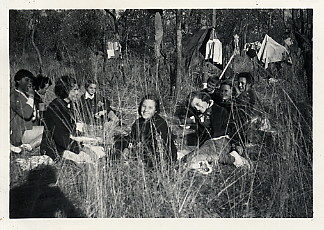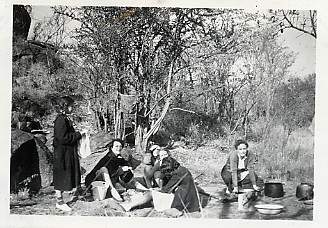Wash Your Hands

Wash Your Hands
Last week my friend Betty Goolsby shared her illuminating experience with Girl Scout latrines in Conroe, Texas. Some things are universal.
Wash Your Hands
The mine manager’s Phoenix House, and our house at #1 Silver Oaks Road were the only two houses on the mine that had indoor Elson toilets and toilet paper when I was born there in 1946. It set us apart.
I avoided, if at all possible, using my friend’s P.K.’s at the bottom of their gardens, where they browsed the old editions of the English tabloid, the Daily Mirror before putting it to its rightful use. It was smelly in there. The paper was rough and there was no where out there to wash our hands afterwards.
There were strict rules at home about hygiene. “This is what separated civilized man from the rest,” Dad would say. Besides the obvious washing of our hands before meals he advised “If you haven’t inspected the kitchen and aren’t sure of the food preparation, then stick to well cooked meals. Skip the fresh fruit and vegetables altogether, unless there is an opportunity to wash and peel them.”
There were so many unseen hazards in not doing so. “Do you know how many cases I’ve had this year of the flagellate Giardia lamblia?” He would ask at the dinner table. “It will wreck havoc with your small intestine. Worse still Entamoeba histolytica might settle in any vital organ of your body and wreck havoc with it. Then there are those other dysenteries, the bacterial Salmonellas and Shigellas to worry about. Rather than the Big Five everyone talks about and house gun racks for protection out on the mines and farms these are the likely life threatening dangers we face. And the antidote is this simple: all you have to do is pay attention to personal hygiene and food preparation. Wash your hands.”
That was all very well. I was listening. At camp though, washing our hands before meals was easier said than done. We relied on the designated Water Patrol to keep the wash house well supplied with buckets of water which were carried from a distance in both hands. We did not have the talent African women have of carrying a bucket of water, a bundle of firewood, or a box of groceries on the top of their heads, mile after mile, along a footpath from the river, with never a spill or a mishap. We washed in enamel basins set in rickety tripod stick furniture we’d made with plenty of mishaps. Of course you were more conservation conscious when you were in Water Patrol yourself than when you weren’t. That was part of the learning process.
Water Patrol also supplied the Cook Patrol and it was equally precious here too. Actually water is always precious in Africa, especially in our rainless winter camping season. I gained a certain amount of notoriety, like the girl who put her shoes outside the tent at night (to be cleaned by a servant early in the morning). Assigned for the very first time to Cook Patrol I volunteered to make the fruit salad for which Africa is famous.
Mom commented, “You’re taking a devil of a time, Diana.”
But I knew Dad would be proud of me. There wouldn’t be any enteric cases out of this camp arriving at the surgery door. Not on my account anyway. I had peeled the grapes.


